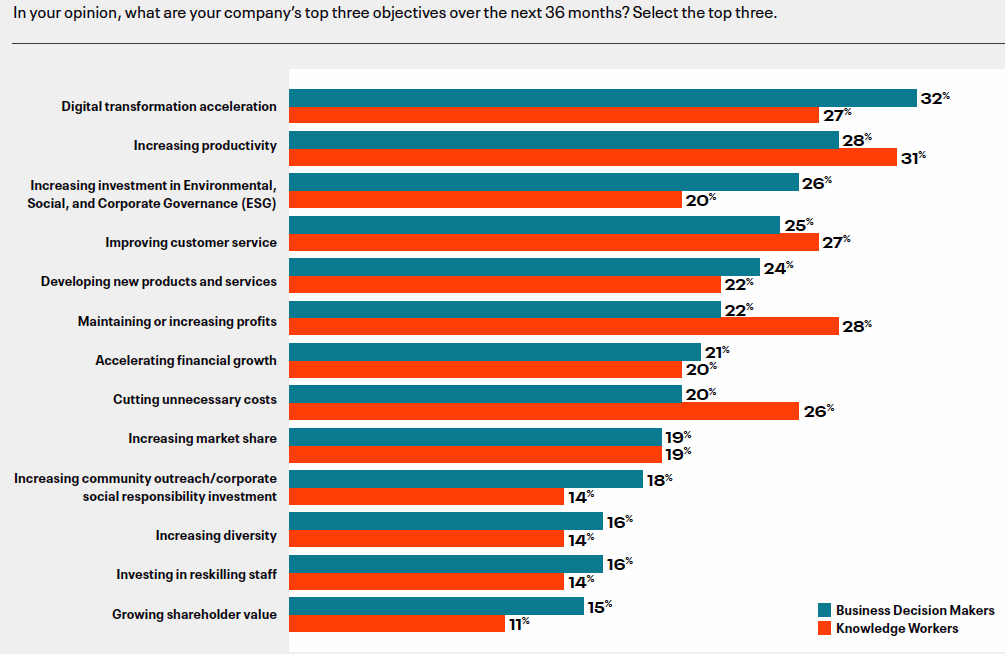Cloudera’s Limitless: The Positive Power of AI Study identified environmental, social and governance (ESG) as a top priority for business leaders and those who fail to act for the good of communities put business growth and talent at huge risk.
New research reveals that 28% of APAC business decision-makers (BDMs) are now putting increasing investment in environmental, social and corporate governance (ESG) ahead of increasing market share (21%) or accelerating financial growth (20%).

Knowledge workers (KWs) believe as much as 50% of the data their business uses on a day-to-day basis should be focused on doing good for the communities it serves. This is a sentiment 54% of business decision-makers agree with — a clear indication that profit and ESG are no longer mutually exclusive pursuits.
The rewards for doing good
Twenty-nine per cent of BDMs and KWs believe that their company should be publicly supporting sustainable business practices. Also, 88% of KWs argue there is a need to use AI to deliver more sustainable business practices that benefit both their organisation and the communities it serves.
But that said, only 27% of BDMs are active regarding the implementation of these technologies and have a limited understanding of how they work. Companies that address these gaps now gain a real competitive advantage in the battle for customers and talent.
If businesses truly want to embed sustainability at their core, leaders must start to use data to deliver more sustainable outcomes – and quickly. Failure to act and 24% of KWs and 30% of BDMs believe employees would leave the business. This could be a business destroying move amidst a global talent shortage, especially if all a company’s competitors are addressing the gap.
“It’s my sincere belief that using big data and AI to make more sustainable business decisions will be a critical aspect of future competitiveness,” said Erica Orange, VP at The Future Hunters. “A core part of this will come down to rethinking business success metrics to go beyond profit-driven metrics and focus on real environmental impact.”
Focus shifting to reskilling investments
The research findings also dispel the long-held belief that workers were afraid of AI taking their jobs. An explosion in the volume of data now available to businesses has made AI/ML a common thread to many job roles and a powerful ally.
Over a quarter of KWs say their daily tasks have been augmented or automated by AI (38%), ML (40%) and Data Analytics (27%) in the last 12 months. The biggest benefits of this are allowing them/their team to focus more on strategic work (38%) and saving time (32%). What’s more, 84% of KWs are now comfortable taking on a new role due to AI/ML/Data Analytics.
To capitalize on this, businesses must do more and invest in employee reskilling. Ninety-six per cent of BDMs said their organisation will commit to continuous investment in reskilling employees as more tasks are automated.
But the investment in people can’t stop there. Companies also need to make employees partners in the upskilling and reskilling processes ensure a level playing field for staff.
“We have seen that businesses in APAC which adopt AI, ML, and Data Analytics as part of digital transformation efforts demonstrate greater business resiliency, flexibility, and agility during these challenging times. Some have even opened new lines of business,” added Remus Lim, vice president, Asia Pacific and Japan, Cloudera.
He opined that utilising data and analytics can yield more benefits than simply increasing profit margins or gaining a competitive advantage.
“Thoughtful data collection and analytics can help us with the success of initiatives close to our hearts, such as sustainability, diversity, equity, and inclusion, and find new ways to serve our communities better while ensuring business continuity,” he concluded.




